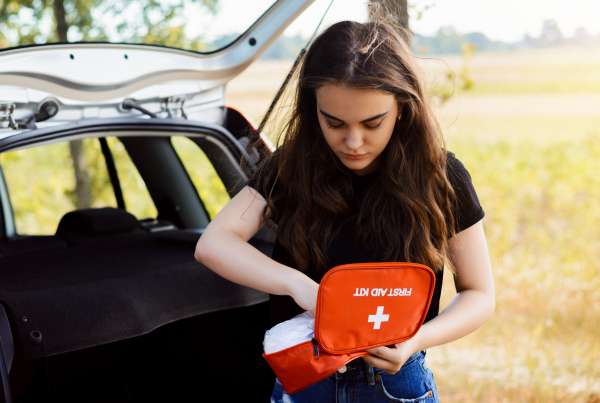Did you know that stress relief for teens during the holidays is important for maintaining mental health and/or mental health conditions?
The holiday season is not particularly well-known for being a source of grief and hardship – yet for a surprising number of Americans, teens included, the holidays are often more synonymous with unwanted or excessive stress than just the feelings of cheer and joy.
Whether it’s the deep winter blues, the costs of heating and rising gas prices, general inflation, the pressure to prepare and host a large feast, the logistics of meeting with family, the financial realities of gift-giving, or the fear of loneliness and isolation in a season punctuated by gathering with family and friends, there are countless reasons why adults and teens alike struggle with stress during the holidays and need healthy (and effective!) outlets for their emotions.
Why Do Teens Need Stress Relief?
Teens aren’t children anymore. They’re quickly entering some of the most stressful years of their lives so far, and for many teens this year, the coming winter season is punctuated by the fears of an ongoing global war, non-stop supply chain issues, another historic inflation and financial crisis, and the deaths and grief of a prolonged pandemic. Let’s dive deeper into some of the reasons today’s teens might feel stressed out.
1. Financial Problems
COVID hit Americans hard, but it’s far from the only reason millions of Americans find themselves closer to poverty than in previous years and more likely to struggle with the coming winter as heating costs soar and the cost of living remains catastrophically high.
Most teens are not in a good position to help their families with these costs and can do little but stand by as the holiday season arrives. For many families, there’s doubt about the bounty on the table, let alone the bounty under the tree.
These stressors and financial anxieties are felt by teens every year throughout the country, but they’re at a historic high right now.
2. Changes In Sleep and Diet
It’s universally known that the holiday season usually means plenty of food and plenty of festivities. And while these are usually good things, they can make life harder for some people – especially teens who thrive on consistency and struggle when their schedule starts to fall apart. This means restless nights, oversleeping, an unbalanced sleep schedule, and copious amounts of overeating.
The holidays maximize these issues, leading to many teens struggling to return to a healthy rhythm in the coming weeks and finding themselves “recovering” from the holidays throughout the first portion of the next year.
It’s important to indulge yourself every now and again. But throwing the baby out with the bathwater every time all the end-of-the-year celebrations turn the corner is often a bad idea.
3. Longer Nights
The holiday season means longer nights for the northern half of the world, which can have a marked impact on a person’s mental state. Some people respond more heavily to a lack of sunlight than others, and loss of daylight can be a major contributing factor in the onset and development of seasonal affective disorder or winter depression. More than just a regular bout of sadness, winter depression is a real mental health issue that is often exacerbated by other holiday woes, including financial trouble and isolation.
But even in people who aren’t diagnosed with seasonal affective disorder, the longer nights and shorter days can lead to an increase in doom and gloom.
Some teens find themselves headed to school early in the morning and headed back home later in the afternoon, with a net zero amount of sunlight for the day. This can be detrimental both to a teen’s mental health and physical health – we need at least some sunlight to restore our vitamin D supplies for healthy bones and skin, as well as certain brain functions.
4. Reminders of Loss
The holiday season is a time for family – and while that’s often a good thing, it can also be a painful reminder of what we’ve lost, especially recently.
The pandemic took many people’s lives, and their loss can be a very difficult thing for teens to process – if it’s the first holidays without a loved relative, for example, your teens might have a hard time focusing on the holiday cheer.
Feeling down after the loss of a loved one is normal, but a loss in combination with other stressors can lead to so-called complicated grief or unresolved loss. This can become a complicated and traumatic issue for many teens, and professional counseling may be recommended to help your teen find healthier and better ways to cope.
Looking for Holiday Fixes
Stress relief for teens can be hard to come by during the holiday season. Consider implementing the following to help your teen (and your family) combat the winter blues and have a more pleasant holiday.
1. Keep a Consistent Schedule
While the winter break means more time for family and for fun, consider encouraging your teen to stick to certain elements in their schedule, especially if a consistent schedule is important for their overall mental well-being.
This includes continuing to go visit the gym or practice an instrument, for example, or swapping studying for a new skill or hobby over the winter break. While it might be tempting to spend the whole holiday season in front of the PlayStation, an unstructured winter break can make it much, much harder to get out of the holiday blues when January rolls around.
2. Consider Volunteer Work
In the spirit of the holidays, consider taking some time with the rest of your family to volunteer for a local cause, whether it’s caring for shelter animals or delivering warming blankets and food to the homeless.
Volunteer work can be a positive way to highlight the spirit of generosity and giving, and research shows that going out of your way to do something for someone else has an immediate positive impact on your mental health. In other words, giving is a gift in itself!
3. Keep Gifts Simple
Another way to help take some of the pressure off the holiday season is by keeping the gifts simple this time around. If your teens feel inclined to take part in the gift-giving ceremony, then they won’t feel as pressured to spend the remainder of their allowance trying to find the right gift for everyone.
Take a “break” from gift-giving this year, especially if you’re a little more hard-pressed at home due to current circumstances, and instead pool your money together for a “family gift” that everyone can enjoy, like replacing an old and broken appliance, or putting a little fund together for a short family trip.
Take Care This Holiday Season
While the holiday season can be stressful one way or another, there’s a lot you can do to alleviate that stress and try to make this holiday season one to remember fondly.
For more information on teen mental health and treatment, visit Visions Treatment Centers.









